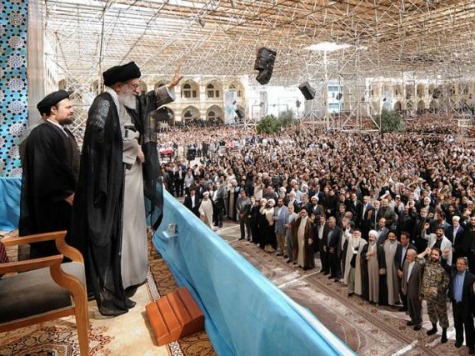The United States government is prepared to directly engage the government of Iran in seeking a resolution to the ongoing conflict in Iraq, according to a Wall Street Journal report.
The ultimate goal of the Ayatollah-led theocratic government of Iran is to establish a worldwide Shia caliphate. The ultimate goal of ISIS, the Al Qaeda splinter group, is to establish a worldwide Sunni caliphate. The only difference in the approaches of the two actors lies in strategy–the route they take to achieve their endgame of global domination.
How soon have we forgotten that Iran is a designated state-sponsor of terror, and one that is responsible for the deaths of hundreds of Americans since the installation of an Islamic Republic of Iran in 1979. The theocratic Iranian regime has been so brutal at times that it has been willing to turn the guns on its own when challenged, as seen in the 2009 green revolution against the Ayatollah.
At this time at least, the United States still considers Iran to be a state-sponsor of terror. The designation clearly states that Iran continues to “provide financial, material, and logistical support for terrorist and militant groups throughout the Middle East and Central Asia.”
Senator Lindsey Graham (R-SC) said on Face the Nation Sunday that the U.S. will need to enlist the help of Iran to stave off ISIS’s march towards Baghdad, likening it to aligning with Russia in WWII to defeat Hitler. Secretary of State John Kerry expressed similar sentiments. When asked whether he would consider coordinating with the Iranians, Kerry said, “I wouldn’t rule out anything that would be constructive.”
This bipartisan approach begs a question: Why do Graham and Kerry feel that the world’s strongest military needs to enlist the help of a country with a force that is exponentially weaker than ours to defeat an extremist fighting force of Salafi jihadist barbarians? While ISIL does, indeed, have U.S.-made armory and weapons in its possession, the group has no means to counter America’s advanced air power.
Sen. Graham also said, “We also need to put [Iran] on notice: Don’t use this crisis to create a satellite state of Iraq controlled by Iran.”
By and large, what Graham cautioned could happen has already happened. Many pundits have observed that much of the reason why ISIL has become so successful in Iraq is because Sunni Muslims have become relegated to second-class citizens. Shia Prime Minister Maliki’s partnership with the Iranian government was comfortable enough that he found a home in Tehran while U.S. coalition forces overthrew Saddam Hussein’s Ba’ath regime. A disclosed Wikileaks cable revealed the King of Saudi Arabia saw Maliki as nothing more than an “Iranian Agent.”
The U.S. State Department concluded in its 2013 Country Reports on Terrorism that Iran has zero interest in stabilizing Iraq; it has, instead, preferred to wage holy war against Sunni Muslims in Iraq. The report stated, “Despite its pledge to support Iraq’s stabilization, Iran trained, funded, and provided guidance to Iraqi Shia militant groups. The IRGC-QF (Iranian Revolutionary Guard Corps-Quds Force), in concert with Hezbollah, provided training outside of Iraq, as well as advisers inside Iraq, for Shia militants in the construction and use of sophisticated improvised explosive device technology and other advanced weaponry.
While the United States has yet to confirm, multitudes of reports confirm that Iran’s special forces, the Quds force, has a presence as large as 2,000 men defending Baghdad. This is the same Quds force that fought against the United States during the Iraq War.
Iran has a long history of carrying out attacks against American citizens and service members.
In 1979, after the installation of an Islamic Republic of Iran, government-sponsored militants stormed the U.S. embassy in Tehran and held hostages in captivity for 444 days. Eight U.S. servicemen died on a mission trying to free the hostages.
In April 1983, an Iranian-sponsored Hezbollah bombing of the U.S. embassy in Beirut, Lebanon, was successfully carried out, killing 63, including 17 Americans and 8 CIA officers. That same year, a suicide bomber attacked the U.S. Marine barracks in Beirut, killing 241 American soldiers.
In December 1988, Pan Am Flight 103 from New York to London was blown out of the sky, killing all 259 people on board. Iran played a significant role in coordinating the bombing. Some even suggest that former Ayatollah Khomeini was personally responsible for ordering the massacre.
In the past few years, evidence has mounted suggesting that Iran played a key role in coordinating the September 11, 2001, Al Qaeda attacks on America.
Less than a month ago, Iran’s chief decision-maker, the Ayatollah Khamenei, announced that Iran would like to destroy America through “battle” and “jihad.”
Furthermore, many have suggested that if it decides to resume uranium enrichment, Iran is only 2-3 weeks away from having the capability to develop nuclear weapons.

COMMENTS
Please let us know if you're having issues with commenting.